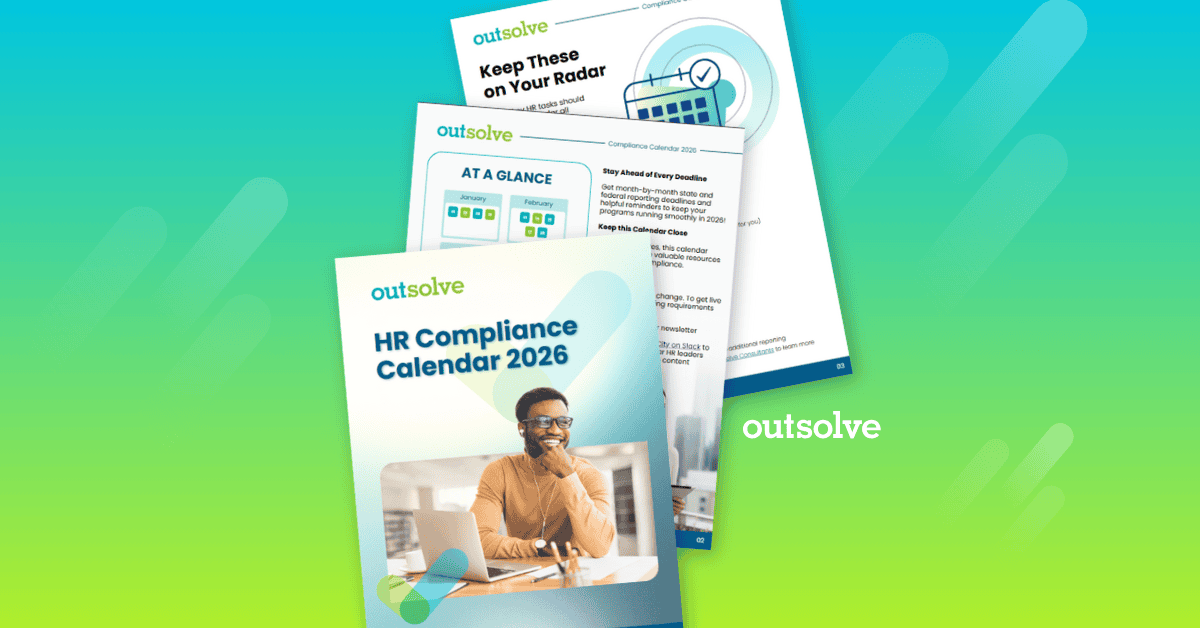
Let’s be honest, talking about pay isn’t always easy. In today’s job market, avoiding the conversation around compensation can cost your company more than a few awkward moments. You could end up facing hefty fines, costly legal battles, and a damaged reputation. Fair, transparent, and competitive pay continues to be a critical part of successful HR strategy, especially when it comes to attracting and retaining top talent.
That’s where an annual compensation review comes in.
A thorough, structured and proactive compensation review process not only helps support internal equity and compliance, but it also sends a clear message to your employees: We see you. We value you. And we’re committed to fair pay.
Here are three key takeaways you’ll learn in this article:
- What an annual compensation review really is
- Why it matters in today’s employment climate
- Six key benefits it can bring to your company
What Is an Annual Compensation Review?
Simply put, an annual compensation review is a structured, organization-wide process where HR or compensation professionals assess how much employees are paid and whether that pay still makes sense.
It’s not about “one off” raises or reactive adjustments. It’s about looking at the full picture. For example, are your employees paid fairly? Are your pay ranges aligned with the external market? Are you at risk of legal exposure due to pay inequities? Are you starting to see pay compression among tenured employees?
A thorough compensation review typically includes the following:
- Compensation benchmarking using market data market data
- Internal equity analysis for fairness across roles and demographics
- Documenting decisions and communicating clearly with leadership and staff
- Reviewing and adjusting pay structures and salary bands
Most often led by the HR team, compensation committee, or compensation consultant, this process makes sure that your pay practices stay competitive, compliant, and consistent with your company’s values.
Why Conduct Annual Compensation Reviews?
The labor market has never been more competitive, or more scrutinized, than it is now. Between employee expectations, increasing demands and laws for pay transparency, and tightening regulations, organizations simply can’t afford to take a “set it and forget it” approach to compensation.
Regular compensation reviews help you:
- Prevent pay stagnation where employees fall behind market rates
- Avoid pay compression when new hires earn more than tenured staff
- Correct internal pay inequities before they become bigger issues
- Stay competitive in a fast-moving market
- Align with legal mandates like pay transparency and equity laws
- Plan proactively for budget needs
- Build trust by showing you care about fair and consistent pay
The bottom line? Regular reviews are no longer a “nice to have.” They’re a business and compliance imperative.
6 Key Benefits of an Annual Compensation Review
Here are 6 key benefits for your company that can come out of annual compensation reviews.
1. Improved Talent Attraction and Retention
In today’s competitive market, compensation is still one of the top reasons employees choose to join or leave a company.
An annual compensation review helps you stay current with industry trends and market rates, which directly supports your recruitment and retention goals. When employees know their pay is being reviewed regularly and fairly, they’re less likely to seek out other opportunities or feel undervalued.
Don’t forget about employer branding. Fair pay practices reflect well on your company. It’s something you can confidently promote during interviews, on your career site and job fairs, and during conversations with candidates. You’ll build a positive reputation this way.
2. Enhanced Pay Equity and Fairness
Let’s talk about pay equity. It's not just a buzzword, it’s the law.
A compensation review helps you proactively identify pay disparities across gender, race, and other demographics. Rather than reacting to pay equity issues when they bubble up (or worse, hit the headlines), you can catch them early and fix them.
By regularly reviewing and analyzing internal pay data, you cultivate a culture of transparency, inclusion, and trust. Employees want to know they’re being paid fairly, not just compared to the market, but to their peers. An annual review shows that you’re “walking the talk.”
3. Data-Driven Decision Making
Compensation decisions should never be based on gut instinct or “how things have always been done.” A strong review process gives you the data you need to make informed, defensible choices.
With access to reliable market benchmarking data and internal analytics, HR and leadership can sync pay decisions with compensation philosophy, industry standards, and long-term talent strategy. No more guesswork, just clarity, consistency, and confidence.
4. Compliance with Pay Transparency Laws
Pay transparency and equity laws are expanding quickly, both across the U.S. and globally. From California and Colorado to the European Union, organizations are required to disclose salary ranges, prove pay equity, and demonstrate accountability in their compensation practices.
An annual compensation review helps you get ahead of compliance. By confirming your pay structures are well-documented and supported by data, you reduce the risk of audits, penalties, or reputation damage. More importantly, you create a smoother path to meet expectations of both regulators and employees.
This will also help current employees’ understanding of their pay levels. If you are hiring for the same position people in your company already hold, they may have questions if the salary range on the job description is more than what they are currently making. Annual reviews will help make this a thing of the past.
5. Better Budget Planning
Compensation is often one of the largest expenses on your balance sheet, so it deserves proactive attention.
With an annual review process, you can anticipate salary adjustments, merit increases, and market changes well before budget season. That means fewer surprises and more control over your financial planning.
You’ll be better equipped to create compensation strategies that scale as your organization grows, rather than scrambling to make reactive decisions when talent gaps or equity issues arise.
6. Boosted Employee Engagement and Trust
This one might be the most important of all. Employees who believe they’re being paid fairly are more engaged, more productive, and more loyal. Regular compensation reviews show your workforce that you’re invested in their growth and well-being. Not just once, but continually.
It reduces resentment. It builds trust, and it turns compensation from a point of confusion into an environment of transparency.
When employees feel valued, they show up fully. And that’s good for everyone.
What Does a Good Compensation Review Process Include?
Not all compensation reviews are created equal. A thorough, high-impact review process typically includes the following components:
- Collecting internal compensation data across all roles and departments
- Benchmarking salaries against trusted external market data
- Evaluating pay equity across gender, race/ethnicity, and other protected categories
- Adjusting salary structures or pay bands based on findings
- Documenting the rationale behind decisions to ensure defensibility
- Communicating outcomes clearly to leadership and eventually to employees
It's also critical to align the review process with your overall compensation philosophy. Ask yourself—Are you aiming to lead, match, or lag the market? Are you prioritizing internal equity or external competitiveness? Defining those answers helps shape your strategy.
How OutSolve Can Help
A robust compensation review takes time, expertise, and access to reliable data. That’s where OutSolve can make all the difference.
Whether you’re just beginning to formalize your compensation process or are ready to take it to the next level, our experts can support you with:
- Compensation benchmarking using current, high-quality market data
- Statistical pay equity analysis to uncover and resolve disparities
- Compliance support to help you understand changing pay transparency laws and regulations
- Custom strategy development aligned with your company’s unique goals and values
- Clear, actionable recommendations you can bring straight to leadership
Partnering with our experts can give you peace of mind that your compensation practices are accurate, fair, and strategic. It also frees you up to focus on what matters most, your people.
What Compensation Reviews Mean for Your Organization
An annual compensation review isn’t just about numbers. Rather, it’s about people, purpose, and progress. It’s a critical tool for building a workplace where fairness isn’t just an idea, but a daily practice.
Want help getting started? Let’s talk. Contact OutSolve today to schedule a consultation and make your next compensation review your best one yet.
Leading Compensation Services at OutSolve, Neil helps organizations align pay, performance, and compliance through data-driven benchmarking, pay equity analytics, and global pay transparency initiatives. His team partners with employers across industries to design and operationalize compensation programs that are fair, competitive, and compliant—supporting business growth, workforce trust, and readiness for evolving regulations, including the EU Pay Transparency Directive. Neil brings over 20 years of experience working with HR, Talent Acquisition, and Compensation teams across the country to build best-in-class compliance programs. He has supported clients in EEOC equal pay charges and has also designed Pay Equity Analytics to provide federal contractors better visibility to pay gaps within their organizations. Neil regularly delivers training on compensation topics for SHRM, ILG, and other industry HR group events. Neil received his undergraduate degree from the University of South Carolina and The University of Hull in England and his MBA from The Citadel. He is also SHRM certified.
Weekly OutLook
Featured Posts

HR Compliance Checklist: What Every HR Pro Needs to Know

New Year, New Deadlines: 2026 HR Compliance Calendar
Related Posts

How to Compliantly Recruit for Section 503 and VEVRAA
Recruiting under Section 503 and the Vietnam Era Veteran’s Readjustment Assistance Act (VEVRAA) can feel like a balancing act, combining compliance...

Common Mistakes Employers Make in Pay Equity Audits
This article is part of an ongoing legal series designed to provide insight and practical guidance on current and emerging workplace compliance...

5 Key Compliance Items HR Can’t Afford to Ignore
Staying ahead of compliance changes can feel like a race against time for anyone in HR. Policies change and reporting requirements expand, making...
 Neil Dickinson
Neil Dickinson

